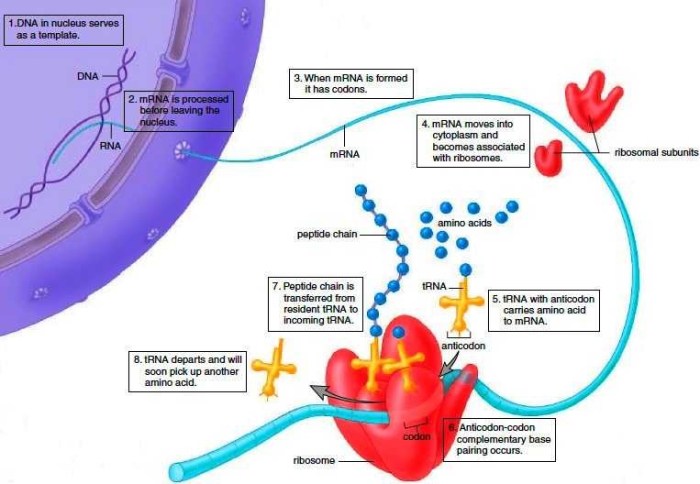Embark on an enlightening journey with our comprehensive protein synthesis and mutations review answer key, a meticulously crafted guide that unravels the intricacies of these fundamental biological processes. Delve into the molecular realm, where DNA, RNA, and ribosomes orchestrate the symphony of protein synthesis, and explore the profound impact of mutations on this delicate dance.
Our narrative unfolds with clarity and precision, weaving together an intricate tapestry of knowledge that illuminates the central dogma of molecular biology, transcription, translation, and the multifaceted world of protein structure and function. Prepare to unravel the mysteries of genetic disorders and witness the transformative potential of protein synthesis in medicine and biotechnology.
Protein Synthesis Overview: Protein Synthesis And Mutations Review Answer Key

Protein synthesis is the process by which cells create proteins, which are essential for a wide range of cellular functions. The central dogma of molecular biology describes the flow of genetic information from DNA to RNA to protein.
DNA (deoxyribonucleic acid) is a double-stranded molecule that stores genetic information in the form of a nucleotide sequence. RNA (ribonucleic acid) is a single-stranded molecule that plays various roles in protein synthesis, including carrying genetic information from DNA to the ribosome.
Ribosomes are complex structures found in the cytoplasm that assemble proteins based on the genetic information carried by mRNA (messenger RNA).
Transcription
Transcription is the process by which an RNA molecule is synthesized from a DNA template. RNA polymerase, along with other transcription factors, binds to a specific region of DNA and separates the DNA strands, using one strand as a template to create a complementary RNA molecule.
The resulting RNA molecule, known as primary transcript, undergoes further processing to produce mature mRNA, which carries the genetic information to the ribosome for protein synthesis.
Translation, Protein synthesis and mutations review answer key
Translation is the process by which the genetic information in mRNA is decoded to produce a specific protein. The ribosome binds to mRNA and reads the sequence of codons (three-nucleotide sequences) present on the mRNA.
Each codon corresponds to a specific amino acid, and tRNA (transfer RNA) molecules bring the appropriate amino acids to the ribosome. The ribosome then links the amino acids together to form a polypeptide chain, which folds into a specific three-dimensional structure to become a functional protein.
Mutations
Mutations are changes in the DNA sequence that can affect the structure and function of proteins. Mutations can be caused by various factors, such as exposure to radiation, chemicals, or errors during DNA replication.
Mutations can be classified into different types based on their size and location, including point mutations (affecting a single nucleotide), insertions, and deletions. Mutations can have significant consequences, including altering the amino acid sequence of proteins and potentially leading to genetic disorders.
Detailed FAQs
What is the central dogma of molecular biology?
The central dogma describes the flow of genetic information from DNA to RNA to protein.
How does transcription occur?
Transcription involves the synthesis of RNA from a DNA template, utilizing RNA polymerase and other transcription factors.
What is the role of tRNA in translation?
tRNA molecules carry specific amino acids to the ribosome during translation, ensuring the correct sequence of amino acids in the growing polypeptide chain.
How can mutations affect protein synthesis?
Mutations can alter the DNA sequence, potentially leading to changes in the amino acid sequence of proteins, which can impact their structure and function.
What are some applications of protein synthesis in medicine?
Protein synthesis is essential for producing therapeutic proteins, such as antibodies and enzymes, used in the treatment of various diseases.